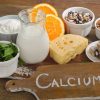Benefits of Calcium in the Diet
The benefits of calcium in the Diet
Your human body needs calcium to build and maintain strong bones. Your heart, muscles and nerves also need calcium to function properly.
Some studies suggest that calcium, along with vitamin D, may have benefits beyond bone health: perhaps protecting against cancer, diabetes and high blood pressure. But evidence about such health benefits is not definitive.
The risks of too little calcium
If you don’t get enough calcium, you could face health problems related to weak bones:
- Children may not reach their full potential adult height.
- Adults may have low bone mass, which is a risk factor for osteoporosis.
Many Australians don’t get enough calcium in their diets. Children and adolescents are at risk, but so are adults age 50 and older.
Human beings need calcium to build and maintain strong bones, and 99% of the body’s calcium is in the bones and teeth. It is also necessary for maintaining healthy communication between the brain and other parts of the body. It plays a role in muscle movement and cardiovascular function.
Calcium naturally occurs in many foods, and food manufacturers add it to certain products. Supplements are also available.
Calcium is a major part of tooth and bone health as well. It makes your bones strong and dense. You can think of your bones as your body’s calcium reservoir. If you don’t get enough calcium in your diet, your body will take it from your bones.
Your body doesn’t produce calcium, so you have to rely on your diet to get the calcium you need. Foods that are high in calcium include:
- dairy products such as milk, cheese, and yogurt
- dark green vegetables such as a kale, spinach, and broccoli
- white beans
- sardines
- calcium-fortified breads, cereals, soy products, and orange juices
Some of the factors that can reduce calcium in your bones and lower your bone density (weaken your bones) include:
- high-salt diet
- more than six drinks per day of caffeine-containing drinks – for example, coffee, cola and energy drinks (and, to a lesser extent, tea)
- excessive alcohol intake
- very low body weight
- very high intakes of fibre (more than 50 g per day, from wheat bran)
- low levels of physical activity
- low levels of vitamin D – people who are housebound or cover their bodies completely when they are outside are at increased risk
smoking.
The benefits of calcium in the Diet
If you are interested in loosing weight, please click here for our HCG Diet Australia professionals to schedule an appointment.










